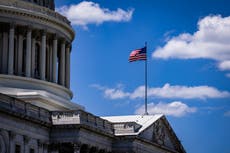House passes bill to create federal holiday for Juneteenth
Joe Biden to sign milestone measure after overwhelming approval in Congress
The House of Representatives has passed a milestone measure to create a federal holiday for Juneteenth, the nation’s oldest commemoration of the abolition of slavery and celebration of African American emancipation.
The US Senate unanimously passed the Juneteenth National Independence Day Act on Tuesday and overwhelming passed in the House on Wednesday. It now heads to President Joe Biden for his signature.
The measure, carried in the House by Democratic US Rep Sheila Jackson Lee of Texas, where Juneteenth was first commemorated in 1866, had more than 160 co-sponsors.
Fourteen House Republicans voted against it.
Juneteenth recognises “a journey of pain, brutality, separation, and the racist hand of people held in bondage,” Ms Lee said on Wednesday. “There’s something about freedom that is contagious, and that is what this holiday will bring about.”
On the House floor introducing the measure, the congresswoman said “Juneteenth is as significant to African Americans as it will be to Americans, because we, too, are American, and it means freedom.”
Following decades of organising for federal recognition, the proposal has gained considerable support over the following year amid racial justice uprisings across the US.
Republicans who voted against it were Thomas Massie of Kentucky, Mo Brooks of Alabama, Scott DesJarlais of Tennessee, Andy Biggs of Arizona, Tom Tiffany of Wisconsin, Doug LaMalfa of California, Tom McClintock of California, Mike Rogers of Alabama, Matt Rosendale of Montana, Ronny Jackson of Texas, Ralph Norman of South Carolina, Andrew Clyde of Georgia, Chip Roy of Texas and Paul Gosar of Arizona.
Though not recognised among the nation’s list of federal holidays, Juneteenth – a portmanteau of June and 19th – has widely represented the emancipation of enslaved African Americans following the Civil War and its violent aftermath.
Some state and local governments have declared it a holiday, and a growing number of companies, universities and other institutions have recognised the day with remembrance events and as a paid holiday.
On 19 June 1865, roughly 2,000 Union Army soldiers landed at Galveston, Texas with news that enslaved people were now free.
But the announcement arrived more than two years after Abraham Lincoln‘s Emancipation Proclamation, which signalled the end of slavery in the US but did not end the enslavement of all people in the nation at the time.
The 13th Amendment to the US Constitution, which formally abolished slavery in the US, wasn’t passed by Congress until 31 January 1865. It was ratified later that year.
The first Juneteenth celebration was observed on 19 June, 1866, when formerly enslaved people in Texas gathered to commemorate their emancipation. The event spread across the US, becoming the nation’s oldest tradition that recognises the abolition of slavery and freedom of African Americans.
In his “What to the Slave Is the Fourth of July?” address in 1852, abolitionist Frederick Douglass noted the nation’s hypocrisy of celebrating Independence Day – just days after 19 June, on 4 July – while imposing a brutal regime of slavery.
Juneteenth is set to become the nation’s 11th legal public holiday. Federal employees will receive a paid day off on 19 June, or on the nearest Friday or Monday.
It will join a list of federal holidays that includes Martin Luther King Jr Day, New Year’s Day, Washington’s Birthday, Memorial Day, Independence Day, Labor Day, Columbus Day, Veterans Day, Thanksgiving and Christmas.
Several House Republicans, though not objecting to the idea of a Juneteenth holiday, argued that the bill should not be named an “Independence Day”, which would undermine the Fourth of July.
Democratic US Rep Rashida Tlaib argued that the caucus should also embrace critical voting rights legislation and other measures to meaningfully lift up Black communities.
Join our commenting forum
Join thought-provoking conversations, follow other Independent readers and see their replies
Comments


Bookmark popover
Removed from bookmarks